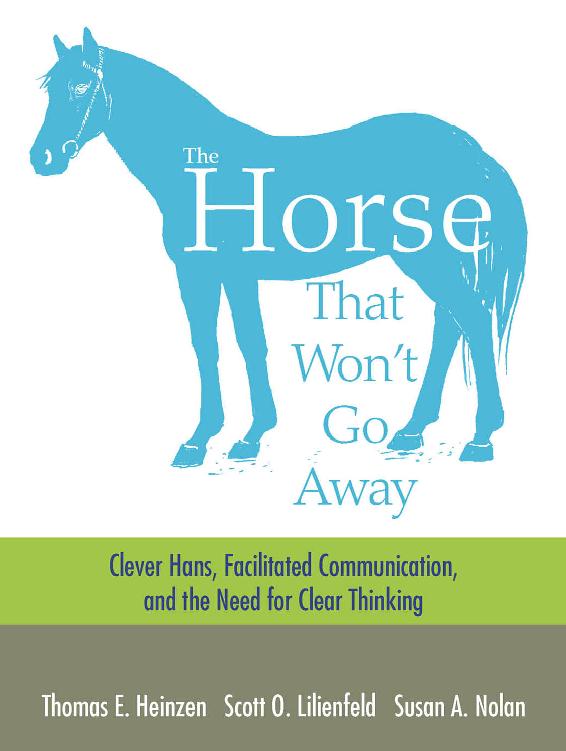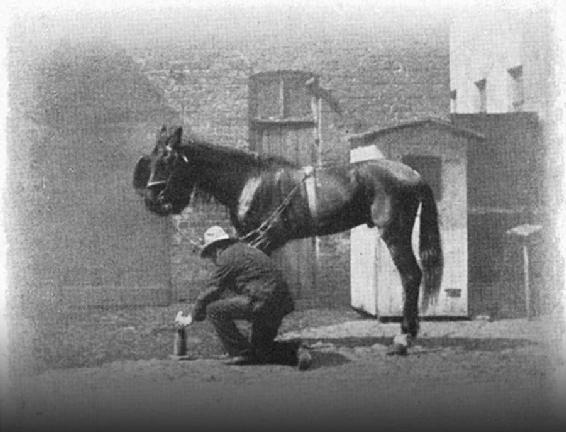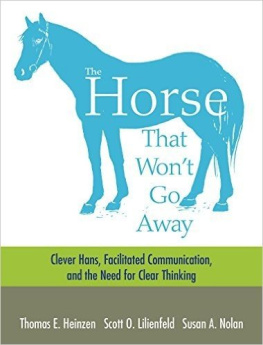

 The Horse That Wont Go Away Clever Hans, Facilitated Communication, and the Need for Clear Thinking
The Horse That Wont Go Away Clever Hans, Facilitated Communication, and the Need for Clear Thinking
Thomas E. Heinzen
William Paterson University
Scott O. Lilienfeld
Emory University
Susan A. Nolan
Seton Hall University
heinzen_fm.indd 1 11/24/14 1:20 PM
Publisher: Rachel Losh
Senior Acquisitions Editor: Daniel DeBonis
Development Editor: Elsa Peterson
Editorial Assistant: Katie Pachnos
Senior Marketing Manager: Lindsay Johnson
Marketing Assistant: Allison Greco
Director of Editing, Design, and Media Production: Tracey Kuehn
Managing Editor: Lisa Kinne
Production Editor: Janice Stangel
Production Manager: Sarah Segal
Photo Editor: Richard Fox
Art Director: Diana Blume
Interior and Cover Designer: Kevin Kall
Art Manager: Matthew McAdams
Illustrations: Lachina
Composition: Linda Harms
Printing and Binding: RR Donnelley Library of Congress Preassigned Control Number: 2014956522 ISBN-10: 1-4641-4574-1 ISBN-13: 978-1-4641-4574-2 2015 by Worth Publishers All rights reserved. Printed in the United States of America First printing Worth Publishers 41 Madison Avenue New York, NY 10010 www.worthpublishers.com heinzen_fm.indd 2 11/24/14 1:20 PM For Michael Brown
Tom Heinzen To James Randi, tireless and fearless slayer of myths
Scott Lilienfeld For Ranko Bojanic
Susan Nolan heinzen_fm.indd 3 11/24/14 1:20 PM
a b o u t t h e a u t h o r sThomas E. Heinzen is Professor of Psychology at William Paterson University of New Jersey.
A graduate of Rockford College, he earned his Ph.D. in social psychology at the State University of New York at Albany. After publishing his first book on frustration and creativity in government, Heinzen worked as a public policy research associate, consulted for the Johns Hopkins Center for Talented Youth, and then began his teaching career. He founded William Paterson Universitys Psychology Club, established an undergraduate research conference, and has been awarded various teaching honors while continuing to write articles, books, and plays that support the teaching of general psychology and statistics. Heinzen, a fellow of the Eastern Psychological Association, is also the editor of Many Things to Tell You, a volume of poetry by elderly writers. Scott O. Scott O.
Lilienfeld is Professor of Psychology at Emory University in Georgia. He received his bachelors degree from Cornell University and his Ph.D. in psychology (clinical) from the University of Minnesota. Lilienfeld is Associate Editor of the Journal of Abnormal Psychology, President of the Society for the Scientific Study of Psychopathy, and past President of the Society for a Science of Clinical Psychology. He iv heinzen_fm.indd 4 11/24/14 1:20 PM has published over 300 articles, chapters, and books on personality and dissociative disorders, psychiatric classification, pseudoscience in psychology, and evidence-based practices in clinical psychology. Susan A. Susan A.
Nolan is Professor of Psychology at Seton Hall University in New Jersey. A graduate of the College of the Holy Cross, she earned her Ph.D. in psychology from Northwestern University. Susan researches interpersonal consequences of mental illness and the role of gender in science and technology fields. Her research has been funded by the National Science Foundation. Susan served as a nongovernmental representative from the American Psychological Association (APA) to the United Nations for five years, and is Vice President for Diversity and International Relations of the Society for the Teaching of Psychology.
She is the 20142015 President of the Eastern Psychological Association (EPA), and is a Fellow of both EPA and APA. v heinzen_fm.indd 5 11/24/14 1:20 PM this page left intentionally blankc o n t e n t s vii heinzen_fm.indd 7 11/24/14 1:20 PM this page left intentionally blank The first principle is that you should not fool yourselfand youare the easiest person to fool. Richard P. Feynman Clear thinking (also called critical thinking) is the hallmark of psychological science. The two stories you are about to read demonstrate how clear thinking works and why it is so important. The first is a story about a determined teacher and his belief that he could teach an ordinary horse to think. The second story is about children and adults with communications difficulties (often attributed to autism) and the dedicated professionals who try to help them based on their belief in a therapeutic technique called facilitated communication. However, both of these stories are really about all of us and our propensity to believe in heinzen_intro.indd 1 11/24/14 1:22 PM h i n t r o d u c t i o n things that cannot be true.
The first principle is that you should not fool yourselfand youare the easiest person to fool. Richard P. Feynman Clear thinking (also called critical thinking) is the hallmark of psychological science. The two stories you are about to read demonstrate how clear thinking works and why it is so important. The first is a story about a determined teacher and his belief that he could teach an ordinary horse to think. The second story is about children and adults with communications difficulties (often attributed to autism) and the dedicated professionals who try to help them based on their belief in a therapeutic technique called facilitated communication. However, both of these stories are really about all of us and our propensity to believe in heinzen_intro.indd 1 11/24/14 1:22 PM h i n t r o d u c t i o n things that cannot be true.
Both accounts are well documented and there is no disagreement about the historical or scientific facts. As a result, we have the best seats in the house to watch as self-deception creeps into these lives and how clear, critical thinking brought some people back to their senses. A classic Sesame Street skit (check it out on YouTube) featuring Bert and Ernie illustrates why we are so enthusiastic about the possibilities of clear thinking: Bert approaches Ernie, who has a banana in his ear. Bert: Why is that banana still in your ear? Ernie: Listen, Bert, I use this banana to keep the alligators away. Bert: Alligators? Ernie, there are no alligators on SesameStreet. Ernie: Right! Its doing a good job, isnt it, Bert? Not surprisingly, Bert is flabbergasted because (a) its a safe bet that alligators arent frightened of bananas; and (b) its easier to spot someone elses crazy beliefs than to spot our own.
Ernie perceived evidence that the banana was working, but Ernies evidence was what psychologists call an illusory correlation believing in a connection that does not exist. Such false beliefs are sometimes called mind bugs, small misconceptions that cause systematic mental errorsest way to diminish the negative effects of false beliefs is by practicing clear, critical thinking. The word critical is often associated with finding fault, but a clear, critical thinker is not someone who readily finds fault with others. In fact, good critical heinzen_intro.indd 2 11/24/14 1:22 PM i n t r o d u c t i o n h thinkers are less likely than other people to find fault with well reasoned ideas. Rather, a critical thinker practices three habits: 1. the humility to admit mistakes; and 3. the courage to think independently in the face of expert and popular opinion. the courage to think independently in the face of expert and popular opinion.
For example, imagine the four possible outcomes in a matrix that Bert could have used to help Ernie see that the correlation he perceives is an illusion. ALLIGATORS ALLIGATORS ALLIGATORS AND BANANAS NOT PRESENT PRESENT What Ernie might have BANANA IN EAR TO REPEL What Ernie observed in this observed had he tried this in ALLIGATORS Sesame Street episode the Everglades What Ernie ignored in all of the What Ernie might have NO BANANA IN EAR TO REPEL other
Next page











 The Horse That Wont Go Away Clever Hans, Facilitated Communication, and the Need for Clear Thinking
The Horse That Wont Go Away Clever Hans, Facilitated Communication, and the Need for Clear Thinking The first principle is that you should not fool yourselfand youare the easiest person to fool. Richard P. Feynman Clear thinking (also called critical thinking) is the hallmark of psychological science. The two stories you are about to read demonstrate how clear thinking works and why it is so important. The first is a story about a determined teacher and his belief that he could teach an ordinary horse to think. The second story is about children and adults with communications difficulties (often attributed to autism) and the dedicated professionals who try to help them based on their belief in a therapeutic technique called facilitated communication. However, both of these stories are really about all of us and our propensity to believe in heinzen_intro.indd 1 11/24/14 1:22 PM h i n t r o d u c t i o n things that cannot be true.
The first principle is that you should not fool yourselfand youare the easiest person to fool. Richard P. Feynman Clear thinking (also called critical thinking) is the hallmark of psychological science. The two stories you are about to read demonstrate how clear thinking works and why it is so important. The first is a story about a determined teacher and his belief that he could teach an ordinary horse to think. The second story is about children and adults with communications difficulties (often attributed to autism) and the dedicated professionals who try to help them based on their belief in a therapeutic technique called facilitated communication. However, both of these stories are really about all of us and our propensity to believe in heinzen_intro.indd 1 11/24/14 1:22 PM h i n t r o d u c t i o n things that cannot be true.